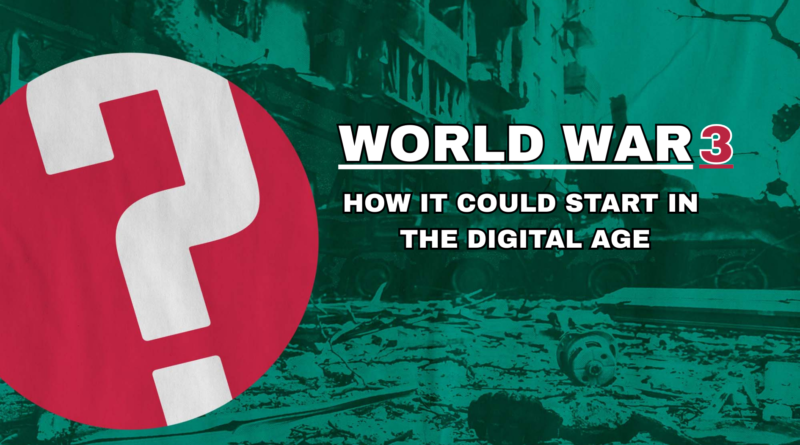WORLD WAR 3: HOW IT COULD START IN THE DIGITAL AGE
When people imagine World War 3, they often think about tanks, fighter jets, and nuclear weapons. But the truth is, the next big war might not begin on a battlefield at all. Instead, it could start silently, through computers, networks, and digital systems. In today’s world, technology connects everything—from banks and hospitals to power grids and even the military. This makes the digital world both powerful and fragile. If countries clash online, the damage could be as serious as traditional warfare.
The Rise of Cyber Warfare
Cyber warfare means using digital attacks to harm another country. Instead of dropping bombs, hackers can shut down electricity, steal military secrets, or spread false information. Many governments already invest heavily in cyber defense and cyber weapons. For example, they build software tools that can secretly enter enemy systems and cause chaos.
Unlike traditional weapons, cyber weapons are hard to trace. If a missile is fired, it is usually clear which country launched it. But in cyberattacks, hackers can hide their location, making it difficult to know who is behind the attack. This confusion could lead to dangerous misunderstandings between countries, raising the risk of a larger conflict.
How a Digital War Could Begin
There are many possible ways World War 3 could start in the digital age. Here are some of the most likely scenarios:
Attacks on Power Grids
Imagine a country losing electricity across major cities. Trains stop, hospitals shut down, and communication systems collapse. This could cause panic and force governments to respond quickly, possibly with military action.
Banking System Collapse
Today’s financial systems depend on digital networks. A massive cyberattack on banks could erase records, freeze accounts, and crash economies. If people lose trust in their money, governments might blame each other and prepare for war.
Military Hacking
If hackers gain access to drones, missiles, or defense systems, they could launch attacks without permission. One wrong move could make a country think it is under attack, leading to retaliation.
Disinformation Campaigns
Wars are not only fought with weapons but also with ideas. In the digital age, fake news and propaganda can spread quickly on social media. If a country spreads lies to create hatred or confusion, it can destabilize societies and push nations into conflict.
Satellite Disruptions
Satellites control GPS, communication, and even military operations. If these are hacked or destroyed, it can blind an entire nation. Losing satellite control in the middle of a tense political situation could trigger war.
The Role of Artificial Intelligence
Artificial Intelligence (AI) makes cyber warfare even more dangerous. AI can detect weaknesses in systems, create smarter viruses, and even make decisions faster than humans. While AI can help defend against attacks, it can also be used as a weapon. If two rival countries use AI to launch automated cyberattacks, the situation could spiral out of control, starting a digital world war without humans realizing it until it is too late.
Why Cyber Wars Are More Risky
A digital war is different from traditional war in many ways:
Speed: Cyberattacks can happen in seconds, faster than governments can respond.
Uncertainty: It is hard to know who attacked first. False blame can lead to wrong decisions.
Global Impact: The internet connects all countries. A cyberattack on one nation might affect others too, dragging more countries into conflict.
Invisible Damage: Unlike bombs, cyberattacks are not always visible. Damage to systems, stolen data, or secret spying may go unnoticed until it is too late.
Small Conflicts Already Happening
While a full world war has not started yet, many small cyber conflicts are already taking place. Countries like the United States, Russia, China, and Iran have accused each other of hacking government and business systems. Even during peace, nations are quietly testing each other’s defenses. These hidden battles show how fragile digital peace really is.
How to Prevent Digital World War
The best way to stop World War 3 from starting online is cooperation. Countries need rules and agreements, just like they did for nuclear weapons. Some steps that can help include:
Global Cybersecurity Treaties
Nations should sign agreements that ban attacks on critical systems like hospitals and water supply.
Better Defense Systems
Governments must invest in protecting their digital infrastructure, just as they protect borders.
Transparency
Countries should share information about major cyber threats to avoid misunderstandings.
Public Awareness
Ordinary people should also be educated about fake news, scams, and digital safety.
Conclusion
World War 3 might not look like the wars of the past. Instead of soldiers fighting in trenches, the battles could happen through invisible codes and silent networks. A digital war could be even more dangerous because it is fast, hard to trace, and affects the entire world. The challenge for humanity is to use technology wisely, build stronger defenses, and create international rules that prevent a small cyber clash from turning into a global war.
If history teaches us one thing, it is that wars often start with small sparks. In the digital age, that spark could be just a few lines of code.




